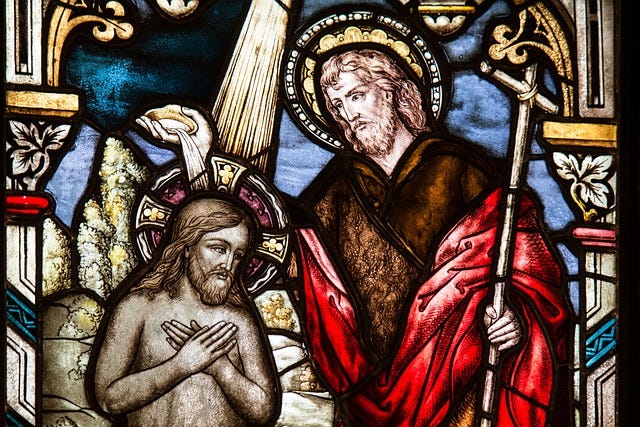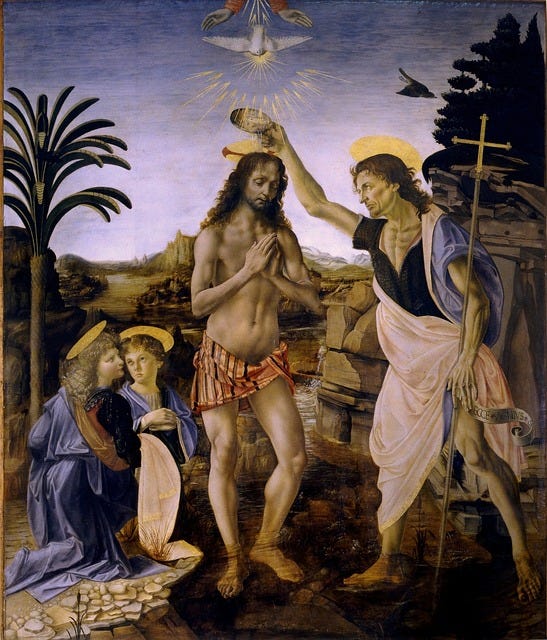Sanctification
What is your mission statement for this year?
I read something this morning that struck me as a “mission statement” for the times in which we live:
In troubled times, however, man often faces the urgent necessity of sanctifying himself completely in order not to lose his soul; he must then be heroically faithful in order not to fall back.1
What exactly does it mean to sanctify myself? Where do I start?
Today, on January 13, we celebrate the Baptism of our Lord Jesus Christ on the traditional liturgical calendar. This commemoration concludes the season of Epiphany and brings full circle the celebration of that great feast. The Church has for centuries linked Epiphany and the Baptism of the Lord in its prayers, believing them to have taken place on the same calendar day.2
By virtue of his baptism, Jesus sanctified the waters of baptism. Christ instituted the sacrament of baptism, instructing his disciples to “[g]o therefore and make disciples of all nations, baptizing them in the name of the Father and of the Son and of the Holy Spirit.”3
With respect to baptism, we believe that
Holy Baptism holds the first place among the sacraments, because it is the door of the spiritual life; for by it we are made members of Christ and incorporated with the Church. And since through the first man death entered into all, unless we be born again of water and the Holy Ghost, we can not enter into the kingdom of Heaven, as Truth Himself has told us.4
Baptism is the first sanctification in the life of a Christian:
The first sanctification takes place at baptism, by which the love of God is infused by the Holy Spirit (Romans 5:5). Newly baptized persons are holy because the Holy Trinity begins to dwell in their souls and they are pleasing to God.5
Is this the end of the process for a Christian? No! Baptism is the first and essential step in the process of sanctification. The second sanctification is a lifelong process:
“The second sanctification is a lifelong process in which a person already in the state of grace grows in the possession of grace and in likeness to God by faithfully corresponding with divine inspirations.”6
All of the writings on Abound in Hope are intended to help with the process of “faithfully corresponding with divine inspirations” by building a life of prayer. It is only through a life of prayer that one becomes a disciple of Jesus Christ. It is only through a life of prayer that one can hear His voice. It is only through a life of prayer that one can be heroically faithful. It is only through a life of prayer that one becomes united with God.
Jesus told us:
My sheep hear my voice, and I know them, and they follow me; and I give them eternal life, and they shall never perish, and no one shall snatch them out of my hand.7
I propose this as our mission statement for this year — to face the urgent necessity of sanctifying ourselves in order not to lose our souls. May God give each of us the grace to desire eternal life and pursue it with urgency! May God give each of us the grace to remain heroically faithful!
Let us hold fast the confession of our hope without wavering, for he who promised is faithful. . . . [W]e are not of those who shrink back and are destroyed, but of those who have faith and keep their souls.8
Vol. 2, Fr. Reginald Garrigou-Lagrange, O.P., The Three Ages of the Interior Life, at 401 (1948) (reprinted by Tan Books in 1989).
“But, did these three Mysteries really take place on this day? Is the Sixth of January the real anniversary of these great events? As the chief object of this work is to assist the devotion of the Faithful, we purposely avoid everything which would savour of critical discussion; and with regard to the present question, we think it enough to state, that Baronius, Suarez, Theophilus Raynaldus, Honorius De Sancta-Maria, Cardinal Gotti, Sandini, Benedict 14th, and an almost endless list of other writers, assert that the Adoration of the Magi happened on this very day. That the Baptism of our Lord, also, happened on the sixth of January, is admitted by the severest historical critics, even by Tillemont himself; and has been denied by only two or three. The precise day of the miracle at the marriage-feast of Cana is far from being as certain as the other two mysteries, though it is impossible to prove that the sixth of January was not the day. For us the children of the Church, it is sufficient that our Holy Mother has assigned the commemoration of these three manifestations for this Feast; we need nothing more to make us rejoice in the triple triumph of the Son of Mary.” Gueranger, The Liturgical Year, Epiphany.
Matthew 28:19, RSV-CE.
“The Decree for the Armenians", in the Bull "Exultate Deo" of Pope Eugene IV, often referred to as a decree of the Council of Florence. Fanning, W. (1907). Baptism. In The Catholic Encyclopedia. New York: Robert Appleton Company. Retrieved January 13, 2023 from New Advent.
Definition of Sanctification, based on Fr. John Hardon's Modern Catholic Dictionary, © Eternal Life.
Definition of Sanctification, based on Fr. John Hardon's Modern Catholic Dictionary, © Eternal Life (“Being made holy. The first sanctification takes place at baptism, by which the love of God is infused by the Holy Spirit (Romans 5:5). Newly baptized persons are holy because the Holy Trinity begins to dwell in their souls and they are pleasing to God. The second sanctification is a lifelong process in which a person alredy in the state of grace grows in the possession of grace and in likeness to God by faithfully corresponding with divine inspirations. The third sanctification takes place when a person enters heaven and becomes totally and irrevocably united with God in the beatific vision. (Etym. Latin sanctificare, to make holy).”).
John 10:27-28, RSV-CE.



